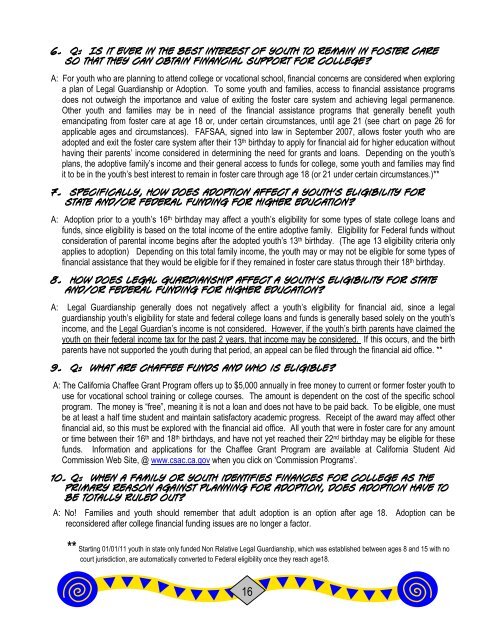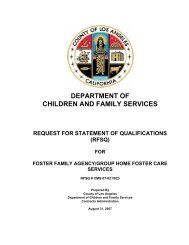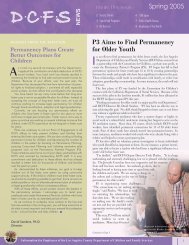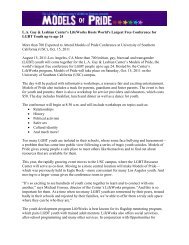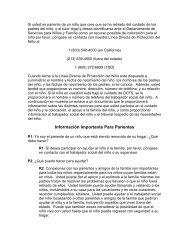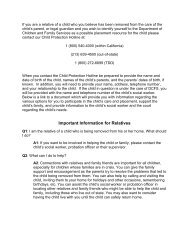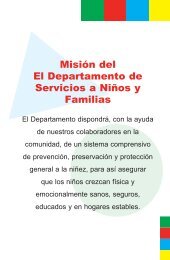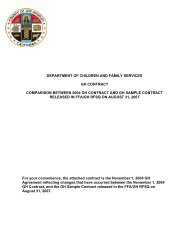Permanency Guide - Los Angeles County Department of Children ...
Permanency Guide - Los Angeles County Department of Children ...
Permanency Guide - Los Angeles County Department of Children ...
You also want an ePaper? Increase the reach of your titles
YUMPU automatically turns print PDFs into web optimized ePapers that Google loves.
6. Q: Is it ever in the best interest <strong>of</strong> youth to remain in foster care<br />
so that they can obtain financial support for college?<br />
A: For youth who are planning to attend college or vocational school, financial concerns are considered when exploring<br />
a plan <strong>of</strong> Legal Guardianship or Adoption. To some youth and families, access to financial assistance programs<br />
does not outweigh the importance and value <strong>of</strong> exiting the foster care system and achieving legal permanence.<br />
Other youth and families may be in need <strong>of</strong> the financial assistance programs that generally benefit youth<br />
emancipating from foster care at age 18 or, under certain circumstances, until age 21 (see chart on page 26 for<br />
applicable ages and circumstances). FAFSAA, signed into law in September 2007, allows foster youth who are<br />
adopted and exit the foster care system after their 13 th birthday to apply for financial aid for higher education without<br />
having their parents’ income considered in determining the need for grants and loans. Depending on the youth’s<br />
plans, the adoptive family’s income and their general access to funds for college, some youth and families may find<br />
it to be in the youth’s best interest to remain in foster care through age 18 (or 21 under certain circumstances.)**<br />
7. Specifically, how does adoption affect a youth’s eligibility for<br />
state and/or federal funding for higher education?<br />
A: Adoption prior to a youth’s 16 th birthday may affect a youth’s eligibility for some types <strong>of</strong> state college loans and<br />
funds, since eligibility is based on the total income <strong>of</strong> the entire adoptive family. Eligibility for Federal funds without<br />
consideration <strong>of</strong> parental income begins after the adopted youth’s 13 th birthday. (The age 13 eligibility criteria only<br />
applies to adoption) Depending on this total family income, the youth may or may not be eligible for some types <strong>of</strong><br />
financial assistance that they would be eligible for if they remained in foster care status through their 18 th birthday.<br />
8. How does Legal Guardianship affect a youth’s eligibility for state<br />
and/or federal funding for higher education?<br />
A: Legal Guardianship generally does not negatively affect a youth’s eligibility for financial aid, since a legal<br />
guardianship youth’s eligibility for state and federal college loans and funds is generally based solely on the youth’s<br />
income, and the Legal Guardian’s income is not considered. However, if the youth’s birth parents have claimed the<br />
youth on their federal income tax for the past 2 years, that income may be considered. If this occurs, and the birth<br />
parents have not supported the youth during that period, an appeal can be filed through the financial aid <strong>of</strong>fice. **<br />
9. Q: What are Chaffee funds and who is eligible?<br />
A: The California Chaffee Grant Program <strong>of</strong>fers up to $5,000 annually in free money to current or former foster youth to<br />
use for vocational school training or college courses. The amount is dependent on the cost <strong>of</strong> the specific school<br />
program. The money is “free”, meaning it is not a loan and does not have to be paid back. To be eligible, one must<br />
be at least a half time student and maintain satisfactory academic progress. Receipt <strong>of</strong> the award may affect other<br />
financial aid, so this must be explored with the financial aid <strong>of</strong>fice. All youth that were in foster care for any amount<br />
or time between their 16 th and 18 th birthdays, and have not yet reached their 22 nd birthday may be eligible for these<br />
funds. Information and applications for the Chaffee Grant Program are available at California Student Aid<br />
Commission Web Site, @ www.csac.ca.gov when you click on ‘Commission Programs’.<br />
10. Q: when a family or youth identifies finances for college as the<br />
primary reason against planning for adoption, does adoption have to<br />
be totally ruled out?<br />
A: No! Families and youth should remember that adult adoption is an option after age 18. Adoption can be<br />
reconsidered after college financial funding issues are no longer a factor.<br />
** Starting 01/01/11 youth in state only funded Non Relative Legal Guardianship, which was established between ages 8 and 15 with no<br />
court jurisdiction, are automatically converted to Federal eligibility once they reach age18.<br />
16


